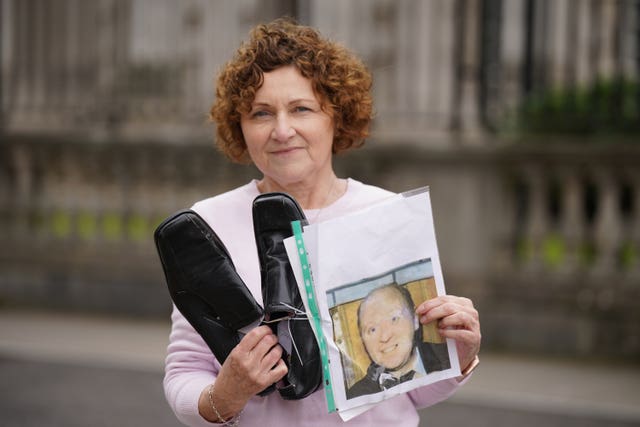
Decisions have been taken not to prosecute two former soldiers over files reported concerning the deaths of a 14-year-old girl and a man 50 years ago.
Annette McGavigan, 14, and William McGreanery, 41, were killed in separate incidents in Londonderry in 1971.
Miss Gavigan was killed during unrest in Derry on September 6. Her family said she had been playing with a friend when she was shot dead.
Her family has been campaigning for decades for justice. There is a mural in her memory in the Bogside area of Derry.

On Monday, Northern Ireland’s Attorney General Dame Brenda King granted a fresh inquest into Miss McGavigan’s death.
It comes days before the Government’s Legacy Act deadline on Wednesday after which all inquests which have not reached their final stages will be halted.
The teenager’s family said they will do everything possible to pursue the inquest direction.
Patricia Coyle, solicitor for the family, said they welcome the decision by the Attorney General, and “will not be deterred in campaigning to action the Attorney General’s direction”.
“Legal challenges persist regarding the Legacy Act including an application to the European Court of Human Rights by the family,” she added.
Mr Greanery died in an incident in the early hours of September 15. His family said they had to fight to clear his name following his death.
On Monday, the Public Prosecution Service (PPS) also said prosecutors were satisfied that he had been unarmed and presented no threat to any soldier.
A former soldier, known as Soldier A, was reported in an investigation file in connection with the death of Mr McGreanery, and a second former soldier, known as Soldier B, was reported in connection with the shooting of Miss McGavigan.
The families of the two were informed of the decision by the PPS on Monday.
PPS assistant director Martin Hardy said his office “carefully considered all the evidence reported in connection with both cases” in the investigation files submitted by the PSNI.
He said the standard of proof needed for a criminal prosecution is high.
“For a conviction, the prosecution must establish beyond a reasonable doubt, through admissible evidence, the commission of a criminal offence by an identified suspect,” he said.
“These two cases were individually considered by two experienced prosecution teams. It has been determined that the available evidence in both cases is insufficient to provide a reasonable prospect of conviction.
“Both cases featured significant evidential difficulties arising from the circumstances in which accounts were taken and recorded, both by the Royal Military Police in 1971, and later by the PSNI’s Historical Inquiries Team.
“In addition, the death of significant witnesses and a failure to conduct effective investigations at the time has undoubtedly hampered more recent investigative efforts and the prosecutorial prospects in these cases.”
The PPS said in the case of Mr McGreanery, prosecutors were satisfied that the available evidence was capable of proving that he had been unarmed and presented no threat to any soldier.
However, the admissible evidence was insufficient to prove that the reported suspect was the soldier known as Soldier A who was responsible for causing Mr McGreanery’s death.
Meanwhile, the PPS said in the case of Miss McGavigan, who was “entirely innocent”, prosecutors could not prove that the reported suspect fired the shots that killed the teenager.
They said it also could not be disproved that the shots may have been aimed at a gunman that some witnesses reported seeing, and were therefore fired in lawful self-defence.
Mr Hardy said they recognise the decisions will be “deeply disappointing” to the victims’ families who he said “lost their loved one in very painful circumstances” and are “understandably still seeking clarity on what happened”.
“We have today written to them to explain the detailed reasons for the decisions and have offered meetings to give any further explanation they may require about the basis of these decisions,” he said.
“As difficult as these outcomes will be for the families of those killed, we have offered assurances that we have taken these decisions only after a thorough and impartial consideration of all the available evidence and relevant legal issues and in line with the Code for Prosecutors.”


Comments: Our rules
We want our comments to be a lively and valuable part of our community - a place where readers can debate and engage with the most important local issues. The ability to comment on our stories is a privilege, not a right, however, and that privilege may be withdrawn if it is abused or misused.
Please report any comments that break our rules.
Read the rules hereLast Updated:
Report this comment Cancel